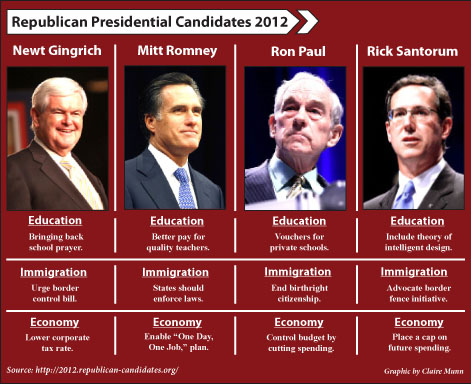 The Republican primary season is underway as the United States heads toward the 2012 presidential election in November.
The Republican primary season is underway as the United States heads toward the 2012 presidential election in November.
To explain the primary process to students, a panel of five IUS professors held a lecture in the University Center on Jan. 31. The main topics discussed were primaries, caucuses and the general processes of public selection for political candidates.
Within the rules decided by the Democratic and Republican Party committees, each state is free to choose their process of candidate selection. The two processes are primaries and caucuses.
“Caucusing is hard,” Rhonda Wrzenski, assistant professor of political science, said. “Primaries are easy.”
Wrzenski explained how primaries are similar to the voting process involved in normal elections.
“On primary day, you can go at any time during voting hours, whenever it fits your schedule,” Wrzenski said. “You go into the privacy both and you can be out in 30 seconds. With a caucus, you have to show up at a specific time, sit there for an hour, and there’s no privacy. You have to stand and state your opinion in front of all of your neighbors.”
Joe Wert, associate professor of political science and dean of the School of Social Sciences, explained three ways primaries and caucuses differ in each state.
In certain states, delegates have to follow party rules, and delegates have to vote for a candidate based on who their state chose.
However, in other states, delegates are given suggestions based on how the state would prefer them to vote.
“Another way they differ is open and closed, primaries or caucuses,” Wert said. “If it’s open, you don’t have to be registered or a member of that political party to vote in the primary or caucus. If it’s closed, you have to be pre-registered with that party in order to vote.”
Primary and caucuses are also different in how balanced delegates are in each state.
“You can have a ‘winner-take-all’ system,” Wert said. “If [a candidate] wins the primary or caucus by even one vote, they get all of that state’s delegates. In a proportional system, the candidate gets a proportion of that state’s delegates, depending on how many votes they win.”
Cliff Staten, professor of political science and international studies, spoke about the Republican candidates in the primaries, which include Rick Santorum, Newt Gingrich, Ron Paul and Mitt Romney.
“It’s clear that Romney is the candidate everyone’s chasing,” Staten said. “We’ve seen the rise and decline of various candidates, or the ‘flavor of the month,’ as one newscaster put it.”
Staten said the current “flavor of the month” is Gingrich.
“The down side of Gingrich is that he has a lot of baggage, which Romney is exploiting,” Staten said, “but Gingrich is a very combative politician. He excites people.”
However, Staten said Romney is also winning polls in Florida, 12-14.
Staten said the goal of the Republicans is to beat President Barack Obama.
“If you look at the polls in the 12 swing states, Obama easily beats Newt Gingrich,” Staten said,” but, if you put Romney up against Obama in those states, it’s a dead heat. Those states will determine the next presidency.”
Staten said, while Romney is well-financed, organized and backed by the Republican Party, social conservations are not supportive of him.
“Surveys indicate that there are people that will not vote for Romney because he’s a Mormon — plain and simple,” Staten said. “The Tea Party is also not too enthused about Romney, so you’ve got rumblings under the base, so to speak.”
Wert highlighted several key issues to look for during the presidential election in November.
“The main [issue] is the economy,” Wert said. “There’s also a lot of anger from Republicans about Obama’s health care bill.”
Overall, Wert said he was happy with the forum and believed it turned out well.
By S.B. WEBER
Staff
samweber@ius.edu


